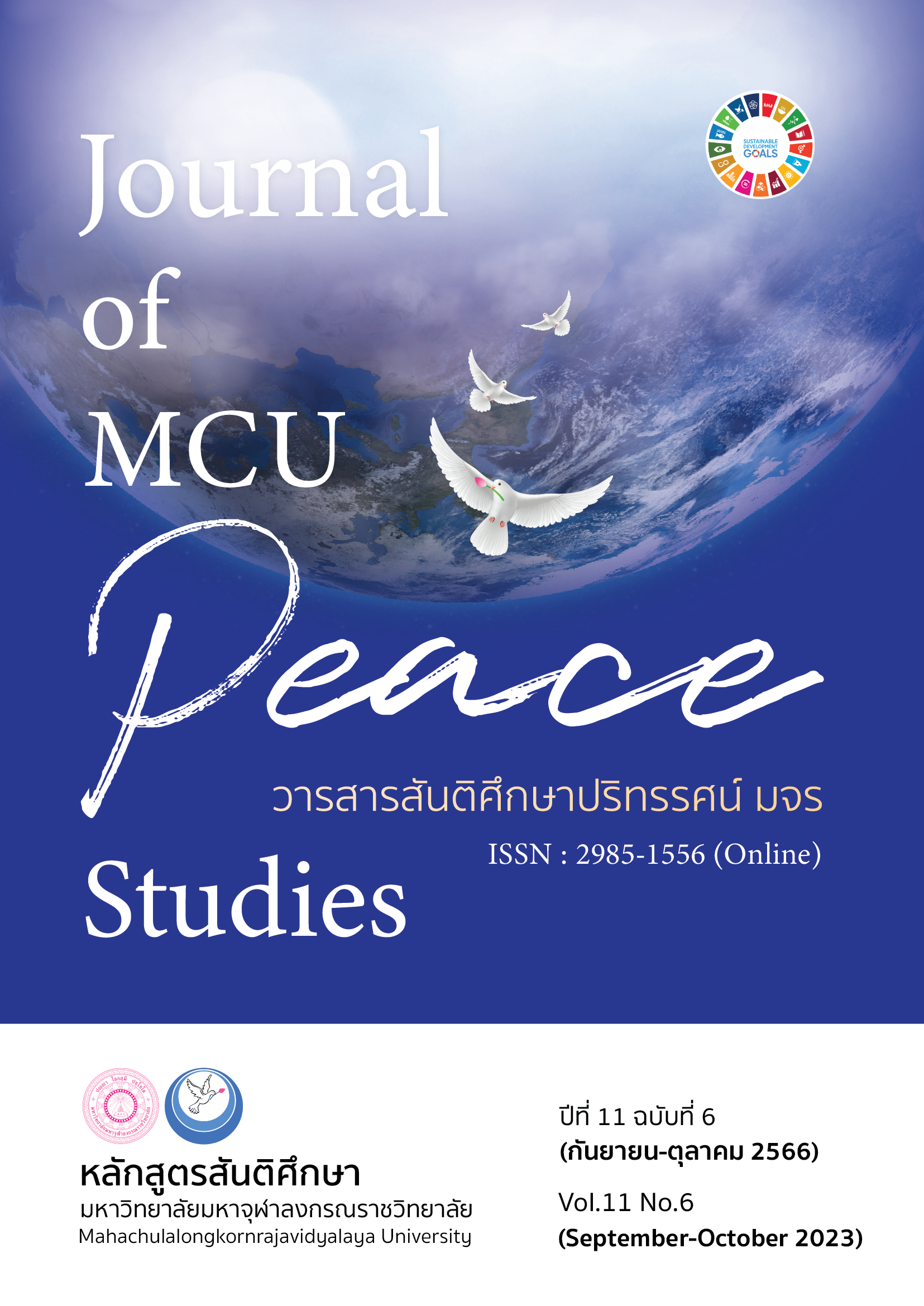รูปแบบการบริหารสถานศึกษาขั้นพื้นฐาน สังกัดสำนักงานคณะกรรมการการศึกษาขั้นพื้นฐาน ที่ส่งผลต่อการพัฒนาสมรรถนะผู้เรียนยุคประเทศไทย 4.0
Main Article Content
บทคัดย่อ
การวิจัยครั้งนี้มีวัตถุประสงค์เพื่อศึกษา 1) องค์ประกอบ และความสัมพันธ์ขององค์ประกอบการบริหารสถานศึกษาขั้นพื้นฐานกับสมรรถนะผู้เรียนสังกัดสำนักงานคณะกรรมการการศึกษาขั้นพื้นฐาน 2) สร้างรูปแบบการบริหารสถานศึกษาขั้นพื้นฐานที่ส่งผลต่อการพัฒนาสมรรถนะผู้เรียนยุคประเทศไทย 4.0 3) ประเมินรูปแบบการบริหารสถานศึกษาขั้นพื้นฐานที่ส่งผลต่อการพัฒนาสมรรถนะผู้เรียนยุคประเทศไทย 4.0 เป็นการวิจัยแบบผสมผสาน กลุ่มตัวอย่างที่ใช้ในการศึกษา คือ โรงเรียนมาตรฐานสากล ระดับมัธยมศึกษา จำนวน 123 โรงเรียน โดยกำหนดขนาดกลุ่มตัวอย่างจากตารางประมาณขนาดกลุ่มตัวอย่างของเครจซี่และมอร์แกน ใช้วิธีการสุ่มกลุ่มตัวอย่างแบบหลายขั้นตอน สุ่มตัวอย่างแบบง่ายโดยวิธีจับฉลาก และกำหนดผู้ให้ข้อมูลเป็นการเลือกแบบเจาะจง จำนวน 492 คน สถิติที่ใช้วิเคราะห์ข้อมูล ได้แก่ ค่าร้อยละ ค่าเฉลี่ย ส่วนเบี่ยงเบนมาตรฐาน และวิเคราะห์ความสัมพันธ์ระหว่างตัวแปร ด้วยวิธีการวิเคราะห์ความถดถอยเชิงเส้น
ผลการวิจัยพบว่า 1. องค์ประกอบการบริหารสถานศึกษาขั้นพื้นฐาน มี 21 องค์ประกอบ และองค์ประกอบที่สัมพันธ์และส่งผลต่อการพัฒนาสมรรถนะผู้เรียนยุคประเทศไทย 4.0 มี 12 องค์ประกอบ เป็นองค์ประกอบหลัก 4 องค์ประกอบ คือ 1) องค์ประกอบสมรรถนะพื้นฐานและทักษะที่จำเป็นของผู้เรียน 2) องค์ประกอบการวัดและประเมินผล 3) องค์ประกอบแหล่งเรียนรู้ 4) องค์ประกอบวัสดุ อุปกรณ์ ครุภัณฑ์ และเป็นองค์ประกอบสนับสนุน 8 องค์ประกอบ คือ 1) องค์ประกอบหลักสูตรสถานศึกษา 2) องค์ประกอบการจัดกระบวนการเรียนรู้ 3) องค์ประกอบศักยภาพครูบุคลากรในการจัดการเรียนรู้ 4) องค์ประกอบการวัด การวิเคราะห์ และการจัดการเรียนรู้ 5) องค์ประกอบบุคคล ภูมิปัญญาท้องถิ่น ปราชญ์ชาวบ้าน 6) องค์ประกอบที่ดิน สิ่งก่อสร้าง อาคารสถานที่ 7) องค์ประกอบสื่อ เทคโนโลยีสารสนเทศและนวัตกรรม และ 8) องค์ประกอบทุนและงบประมาณ 2. รูปแบบการบริหารสถานศึกษาขั้นพื้นฐานที่ส่งผลต่อการพัฒนาสมรรถนะผู้เรียนยุคประเทศไทย 4.0 มีองค์ประกอบ 8 องค์ประกอบ ประกอบด้วย 1) ชื่อรูปแบบ 2) หลักการ แนวคิดพื้นฐาน และความเป็นมาของรูปแบบ 3) วัตถุประสงค์ 4) เป้าหมาย 5) ลักษณะของรูปแบบ 6) แนวทางการนำองค์ประกอบการบริหารสถานศึกษา ขั้นพื้นฐานไปใช้พัฒนาสมรรถนะผู้เรียน 7) การวัดและประเมินผล และ 8) ปัจจัยสู่ความสำเร็จ 3. รูปแบบการบริหารสถานศึกษาขั้นพื้นฐานที่ส่งผลต่อการพัฒนาสมรรถนะผู้เรียนยุคประเทศไทย 4.0 ทั้ง 8 องค์ประกอบ มีความถูกต้อง มีความเหมาะสม มีความเป็นไปได้ และมีความเป็นประโยชน์ คิดเป็นร้อยละ 100
Article Details

อนุญาตภายใต้เงื่อนไข Creative Commons Attribution-NonCommercial-NoDerivatives 4.0 International License.
ทัศนะและความคิดเห็นที่ปรากฏในบทความในวารสาร ถือเป็นความรับผิดชอบของผู้เขียนบทความนั้น และไม่ถือเป็นทัศนะและความรับผิดชอบของกองบรรณาธิการ ยินยอมว่าบทความเป็นลิขสิทธิ์ของวารสาร
เอกสารอ้างอิง
Abdkullo, V., & Niumthep, W. (2020). Learning Environment to Promote Learning Skills in the 21st Century "Concepts, Theories and Practice". Narathiwat Rajanagarind University Journal Humanities and Social Sciences, 7(2), 227-246.
Athikiat, K., & Sartoernkaew, T. (2021). Modern Teaching and New Teaching Methods. Retrieved January 15, 2021, from http:/www.regis.skru.ac.th
Boonmi, W. (2021). Teaching and Learning in the 21st Century. Journal of Corporate Administration and Local Innovation, 7(9), 373-385.
Chandsuk, C. (2017). Development of a Performance Evaluation Model Against the Generous Care of Nursing Martyrs. Bangkok: Royal Institute of Public Health.
Chatphakarat, T. et al. (2018). Development of Smart Community Learning Resources in the Culture that 21 to Promote Lifelong Learning Characteristics of the People. Bangkok: Office of Educational Technology, Sukhothai Thammathirat University, Federation of Thailand.
Institute for the Promotion of Teaching Science and Technology. (2020). PISA Measurement. Retrieved August 18, 2020, from http: /www.pisathailand.ipst.ac.th
Ivancevich, J. H. et al. (1989). Management: Principles and Function. (4th Ed.). Boston MA: Richard D. Irwin.
Keeves, J. P. (1994). Models and Model Building. The International Encyclopedia of Education, 7, 560-569.
Lekkongsunkhie, P. (2021). The Administrative Style to the Excellence of Educational Institutions under the Office of Secondary Education Area, District 31. Academic Journal of Suvarnabhumi Institute of Technology, 7(1), 217-219.
Niyamapa, A. (2022). The New Educational Institution Management Style to Desirable Educational Quality in a Changing Context. Journal of Education,Sukhothai Thammathirat University, 14(2), 184-185.
Panthup, M. (2014). Quality Management of Secondary Schools in Accordance with the National Quality Award (TQA) in Intensive School of International Standards. Bangkok: Institute of Teacher Development and Educational Personnel.
Prasertsin, A. (2021). Guidelines for Measuring and Evaluating Performance Bases in the 21st Century. Mahasarakham University's Journal of Education and Evaluation, 27(2), 16-31.
Ranguptuk, W. (2020). Thai Children's Ability in the Global Era Has Changed (VUCA World). Kurusapa Wittayachan, 1(1), 8-18.
Ratanasiriprapa, N. (2017). Academic Quality According to the Opinion of the Board of Education Angthong Primary Educational Service Area Office.Kamphaengphet: Kamphaengphet Rajabhat University.
Stufflebeam, D. L. (1981). Evaluation Models. San Francisco: Jossey-Bass.
The Office of the Basic Education Commission, Office of Secondary Education Administration. (2012). Guidelines for Educational Management in International Standard Schools, Revised Edition. Bangkok: Thai Agricultural Cooperative Federation Meeting.
The Office of the Basic Education Commission, Office of Secondary Education Administration. The Office of the Secretariat of the Education Council (2021). Research Report on the Performance of Students in the 4th-6th Grade of Primary School for Basic Level of Medicine Education. Standard Group, Office of Education and Learning Development, Bangkok: 21st Century Co., Ltd.
The Office of the Secretariat of the Education Council. (2021).Report on Development of Patterns and Mechanisms for Developing Learners and Promoting Wisdom (Summary).Learning Policy Development Group Office, Office of Education and Learning Development, Bangkok: SBK Publishing Co., Ltd.


